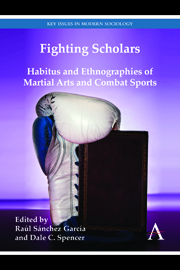Book contents
- Frontmatter
- Dedication
- Epigraph
- Contents
- Contributors
- Glossary
- Chapter 1 Introduction: Carnal Ethnography as Path to Embodied Knowledge
- Chapter 2 Habitus as Topic and Tool: Reflections on Becoming a Prizefighter
- Chapter 3 In Search of a Martial Habitus: Identifying Core Dispositions in Wing Chun and Taijiquan
- Chapter 4 Each More Agile Than the Other: Mental and Physical Enculturation in Capoeira Regional
- Chapter 5 ‘There Is No Try in Tae Kwon Do’: Reflexive Body Techniques in Action
- Chapter 6 ‘It Is About Your Body Recognizing the Move and Automatically Doing It’: Merleau-Ponty, Habit and Brazilian Jiu-Jitsu
- Chapter 7 ‘Do You Hit Girls?’: Some Striking Moments in the Career of a Male Martial Artist
- Chapter 8 The Teacher's Blessing and the Withheld Hand: Two Vignettes of Somatic Learning in South India's Indigenous Martial Art Kalarippayattu
- Chapter 9 White Men Don't Flow: Embodied Aesthetics of the Fifty-Two Hand Blocks
- Chapter 10 Japanese Religions and Kyudo (Japanese Archery): An Anthropological Perspective
- Chapter 11 Taming the Habitus: The Gym and the Dojo as ‘Civilizing Workshops’
- Chapter 12 ‘Authenticity’, Muay Thai and Habitus
- Chapter 13 Conclusion: Present and Future Lines of Research
- Epilogue Homines in Extremis: What Fighting Scholars Teach Us about Habitus
- References
Epilogue - Homines in Extremis: What Fighting Scholars Teach Us about Habitus
Published online by Cambridge University Press: 05 March 2014
- Frontmatter
- Dedication
- Epigraph
- Contents
- Contributors
- Glossary
- Chapter 1 Introduction: Carnal Ethnography as Path to Embodied Knowledge
- Chapter 2 Habitus as Topic and Tool: Reflections on Becoming a Prizefighter
- Chapter 3 In Search of a Martial Habitus: Identifying Core Dispositions in Wing Chun and Taijiquan
- Chapter 4 Each More Agile Than the Other: Mental and Physical Enculturation in Capoeira Regional
- Chapter 5 ‘There Is No Try in Tae Kwon Do’: Reflexive Body Techniques in Action
- Chapter 6 ‘It Is About Your Body Recognizing the Move and Automatically Doing It’: Merleau-Ponty, Habit and Brazilian Jiu-Jitsu
- Chapter 7 ‘Do You Hit Girls?’: Some Striking Moments in the Career of a Male Martial Artist
- Chapter 8 The Teacher's Blessing and the Withheld Hand: Two Vignettes of Somatic Learning in South India's Indigenous Martial Art Kalarippayattu
- Chapter 9 White Men Don't Flow: Embodied Aesthetics of the Fifty-Two Hand Blocks
- Chapter 10 Japanese Religions and Kyudo (Japanese Archery): An Anthropological Perspective
- Chapter 11 Taming the Habitus: The Gym and the Dojo as ‘Civilizing Workshops’
- Chapter 12 ‘Authenticity’, Muay Thai and Habitus
- Chapter 13 Conclusion: Present and Future Lines of Research
- Epilogue Homines in Extremis: What Fighting Scholars Teach Us about Habitus
- References
Summary
The function of habitus is, precisely, to restore to the agent a generative and unifying power, a constructive and classifying potency, while at the same time reminding us that this capacity to construct social reality, itself socially constructed, is not that of a transcendental subject but that of a socialized body, which engages in practice organizing principles that are socially constructed and acquired in the course of a social experience at once situated and dated.
—Pierre Bourdieu, Pascalian MeditationsI am gratified that Body and Soul served as stimulus and inspiration for the studies gathered in Fighting Scholars, since it was always my intention to make a case for, and to attract others to, the incarnate study of incarnation by practical example — rather than by theoretical expostulation or methodological supplication, which would have contradicted that very case. I am doubly pleased that its contributors have extended the reach and refined the arguments of my book in manifold new directions, connecting them with theoretical perspectives and empirical agendas beyond the one I pursued in my ethnography of the social springs and lived magnetism of prizefighting as plebeian bodily craft in the black American ghetto (Wacquant 2004a).
Fighting Scholars gathers lush materials and precise analyses of interest not only to sociologists of practice and embodiment within the narrow province of sport, but also to generalist students of discipline, violence, gender, religion, emotions, reflexivity, field methodology and social epistemology insofar as inquiring into martial arts and combat sports via apprenticeship inevitably raises these issues.
- Type
- Chapter
- Information
- Fighting ScholarsHabitus and Ethnographies of Martial Arts and Combat Sports, pp. 193 - 200Publisher: Anthem PressPrint publication year: 2013

